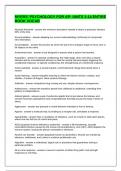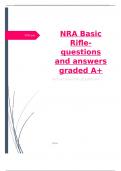MYERS' PSYCHOLOGY FOR AP: UNITS 1-14 ENTIRE
BOOK VOCAB
Absolute threshold - answer-the minimum stimulation needed to detect a particular stimulus
50% of the time.
Accommodation - answer-adapting our current understandings (schemas) to incorporate
new information.
Accomodation - answer-the process by which the eye's lens changes shape to focus near or
far objects on the retina.
Achievement test - answer-a test designed to assess what a person has learned.
Acquisition - answer-in classical conditioning, the initial stage, when one links a neutral
stimulus and an unconditioned stimulus so that the neutral stimulus begins triggering the
conditioned response. In operant conditioning, the strengthening of a reinforced response.
Action potential - answer-a neural impulse; a brief electrical charge that travels down a
neuron.
Active listening - answer-empathic listening in which the listener echoes, restates, and
clarifies. A feature of Rogers' client-centered therapy.
Addiction - answer-compulsive drug craving and use, despite adverse consequences.
Adolescence - answer-the transition period from childhood to adulthood, extending from
puberty to independence.
Adrenal glands - answer-a pair of endocrine glands that sit just above the kidneys and
secrete hormones (epinephrine and norepinephrine) that help arouse the body in times of
stress.
Aggression - answer-any physical or verbal behavior intended to hurt or destroy.
Agonist - answer-a molecule that, by binding to a receptor site, stimulates a response.
Agoraphobia - answer-fear or avoidance of situations, such as crowds or wide-open places,
where one has felt loss of control and panic.
AIDS (acquired immune deficiency syndrome) - answer-a life-threatening, sexually
transmitted infection caused by the human immunodeficiency virus (HIV). AIDS depletes the
immune system, leaving the person vulnerable to infections.
Alcohol use disorder - answer-(popularly known as alcoholism). Alcohol use marked by
tolerance, withdrawal, and a drive to continue problematic use.
Algorithm - answer-a methodical, logical rule or procedure that guarantees solving a
particular problem.
All-or-none response - answer-a neuron's reaction of either firing (with a full-strength
response) or not firing.
,Alpha waves - answer-the relatively slow brain waves of a relaxed, awake state.
Altruism - answer-unselfish regard for the welfare of others.
Amphetamines - answer-drugs that stimulate neural activity, causing speeded-up body
functions and associated energy and mood changes.
Amygdala - answer-two lima-bean-sized neural clusters in the limbic system; linked to
emotion.
Anorexia nervosa - answer-an eating disorder in which a person (usually an adolescent
female) maintain a starvation diet despite being significantly (15 percent or more)
underweight.
Antagonist - answer-a molecule that, by binding to a receptor site, inhibits or blocks a
response.
Anterograde amnesia - answer-an inability to form new memories.
Antianxiety drugs - answer-drugs used to control anxiety and agitation.
Antidepressant drugs - answer-drugs used to treat depression, anxiety disorders, obsessive-
compulsive disorder, and posttraumatic stress disorder. (Several widely used antidepressant
drugs are selective serotonin reuptake inhibitors—ssris.)
Antipsychotic drugs - answer-drugs used to treat schizophrenia and other forms of severe
thought disorder.
Antisocial personality disorder - answer-a personality disorder in which a person (usually a
man) exhibits a lack of conscience for wrongdoing, even toward friends and family members.
May be aggressive and ruthless or a clever con artist.
Anxiety disorders - answer-psychological disorders characterized by distressing, persistent
anxiety or maladaptive behaviors that reduce anxiety.
Aphasia - answer-impairment of language, usually caused by left-hemisphere damage either
to Broca's area (impairing speaking) or to Wernicke's area (impairing understanding).
Applied research - answer-scientific study that aims to solve practical problems.
Aptitude test - answer-a test designed to predict a person's future performance; aptitude is
the capacity to learn.
Assimilation - answer-interpreting our new experiences in terms of our existing schemas.
Association areas - answer-areas of the cerebral cortex that are not involved in primary
motor or sensory functions; rather, they are involved in higher mental functions such as
learning, remembering, thinking, and speaking.
Associative learning - answer-learning that certain events occur together. The events may
be two stimuli (as in classical conditioning) or a response and its consequences (as in
operant conditioning).
,Attachment - answer-an emotional tie with another person; shown in young children by their
seeking closeness to the caregiver and showing distress on separation.
Attention-deficit/hyperactivity disorder (ADHD) - answer-a psychological disorder marked by
the appearance by age 7 of one or more of three key symptoms: extreme inattention,
hyperactivity, and impulsivity.
Attitude - answer-feelings, often influenced by our beliefs, that predispose us to respond in a
particular way to objects, people, and events.
Attribution theory - answer-the theory that we explain someone's behavior by crediting either
the situation or the person's disposition.
Audition - answer-the sense or act of hearing.
Autism spectrum disorder (ASD) - answer-a disorder that appears in childhood and is
marked by significant deficiencies in communication and social interaction, and by rigidly
fixated interests and repetitive behaviors.
Automatic processing - answer-unconscious encoding of the incidental information, such as
space, time, and frequency, and of well-learned information.
Autonomic nervous system (ANS) - answer-the part of the peripheral nervous system that
controls the glands and the muscles of the internal organs (such as the heart). Its
sympathetic division arouses; its parasympathetic division calms.
Availability heuristic - answer-estimating the likelihood of events based on their availability in
memory.
Aversive conditioning - answer-a type of counterconditioning that associates an unpleasant
state (such as nausea) with an unwanted behavior (such as drinking alcohol).
Axon - answer-the neuron extension that passes messages through its branches to other
neurons or to muscles or glands.
Babbling stage - answer-beginning at about 4 months, the stage of speech development in
which the infant spontaneously utters various sounds at first unrelated to the household
language.
Barbiturates - answer-drugs that depress the activity of the central nervous system, reducing
anxiety but impairing memory and judgment.
Basal metabolic rate - answer-the body's resting rate of energy expenditure.
Basic research - answer-pure science that aims to increase the scientific knowledge base.
Basic trust - answer-according to Erik Erikson, a sense that the world is predictable and
trustworthy; said to be formed during infancy by appropriate experiences with responsive
caregivers.
Behavior genetics - answer-the study of the relative power and limits of genetic and
environmental influences on behavior.
Behavior therapy - answer-therapy that applies learning principles to the elimination of
unwanted behaviors.
, Behavioral approach - answer-in personality theory, this perspective focuses on the effects
of learning on our development.
Behavioral psychology - answer-the scientific study of observable behavior, and its
explanation by principles of learning.
Behaviorism - answer-the view that psychology (1) should be an objective science that (2)
studies behavior without reference to mental processes. Most research psychologists today
agree with (1) but not with (2).
Belief perseverance - answer-clinging to one's initial conceptions after the basis on which
they were formed has been discredited.
Binge-eating disorder - answer-significant binge-eating episodes, followed by distress,
disgust, or guilt, but without the compensatory purging or fasting that marks bulimia nervosa.
Binocular cues - answer-depth cues, such as retinal disparity, that depend on the use of two
eyes.
Biofeedback - answer-a system for electronically recording, amplifying, and feeding back
information regarding a subtle physiological state, such as blood pressure or muscle tension.
Biological psychology - answer-the scientific study of the links between biological (genetic,
neural, hormonal) and psychological processes. (Some biological psychologists call
themselves behavioral neuroscientists, neuropsychologists, behavior geneticists,
physiological psychologists, or biopsychologists.)
Biomedical therapy - answer-prescribed medications or procedures that act directly on the
person's physiology.
Biopsychosocial approach - answer-an integrated approach that incorporates biological,
psychological, and social-cultural levels of analysis.
Bipolar disorder - answer-a mood disorder in which a person alternates between the
hopelessness and lethargy of depression and the over-excited state of mania. (Formerly
called manic-depressive disorder.)
Blind spot - answer-the point at which the optic nerve leaves the eye, creating a "blind" spot
because no receptor cells are located there.
Bottom-up processing - answer-Analysis that begins with the sensory receptors and works
up to the brain's integration of sensory information.
Brainstem - answer-the oldest part and central core of the brain, beginning where the spinal
cord swells as it enters the skull; the brainstem is responsible for automatic survival
functions.
Broca's area - answer-controls language expression—an area of the frontal lobe, usually in
the left hemisphere, that directs the muscle movements involved in speech.
Bulimia nervosa - answer-an eating disorder in which a person alternates binge eating
(usually of high-calorie foods) with purging (by vomit ing or laxative use) or fasting.





